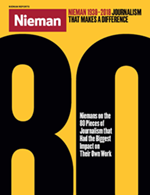Year in Review
Celebrating 80 Years of Fellowship

Margarita Martinez, NF ’09, and Nobel Peace Prize winner Juan Manuel Santos, former president of Colombia and a 1988 Nieman Fellow
Each Tuesday evening during the academic year at Harvard, Nieman Fellows present their Soundings—the stories behind their own unique career paths—and answer the question posed by Nieman curator Ann Marie Lipinski: “Why do you do what you do?” The comments from these journalists are heartfelt, sometimes surprising and often awe-inspiring.
This year, the Nieman Foundation had a special opportunity to reflect on the same question when planning the 80th reunion weekend in October. After eight decades of serving journalists and journalism, the foundation organized a program that highlighted the best of what we do: nurturing and educating journalists through Nieman fellowships; reporting on the most pressing issues facing journalism in Nieman publications; and serving the profession through our programming, including special conferences, seminars and shop talks.
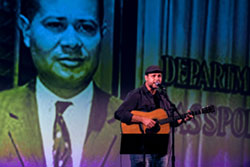
Alastair Moock performs "The Ballad of William Worthy"
To kick off the 80th anniversary celebration, we presented an evening of live storytelling at Harvard’s Memorial Church, featuring 10 Nieman alumni whose work spans a half century of journalism around the world and across media platforms. Harvard faculty were generous participants in our “90-Minute Nieman,” a morning of talks by some of the university’s most provocative thinkers.
In a special fellow-to-fellow conversation, former Colombian president and Nobel Peace Prize winner Juan Manuel Santos, a fellow in the Nieman class of 1988, spoke with Margarita Martinez, NF ’09, about his efforts to end five decades of civil war in their country through peace negotiations with the FARC guerillas. Martinez chronicles those talks in her documentary “La Negociación.” Although he left journalism for a career in public office, Santos said, “Thirty years ago I was here as a Nieman Fellow and since then I’ve been repeating myself: The best year of my life was the Nieman.”
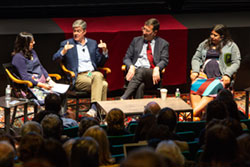
From left: Indira Lakshmanan, NF ’04; Stephen Engelberg; John Harwood, NF ’90; and Samhita Mukhopadhyay
We also hosted a panel discussion about the boundaries between journalism and activism moderated by Indira Lakshmanan, NF 04, executive editor at the Pulitzer Center on Crisis Reporting. The panel included ProPublica editor-in-chief Stephen Engelberg, CNBC editor-at-large John Harwood, NF ’90, and Teen Vogue executive editor Samhita Mukhopadhyay.
Throughout the weekend, those attending had time to share ideas, catch up on news, learn new ways of tackling reporting, and celebrate the strength and value of Nieman fellowship. Our reunion photo galleries capture the spirit of the weekend:
Events
Nieman organized a number of important events in 2018:

Participants in Nieman’s “Covering Nuclear Issues” workshop visit the Massachusetts Emergency Management Agency
In March, we hosted “Covering Nuclear Issues: A Workshop for Journalists,” a three-day conference made possible with the generous support of the John D. and Catherine T. MacArthur Foundation and with assistance from the Belfer Center for Science and International Affairs at Harvard Kennedy School. The event brought a diverse group of reporters, academics, researchers and practitioners together to help journalists deepen their reporting skills and expand their thinking around nuclear issues. Among the presenters were keynote speakers David Sanger, national security correspondent at The New York Times and a senior fellow for national security and the press at the Belfer Center, and Gary Samore, the Belfer Center’s executive director for research.
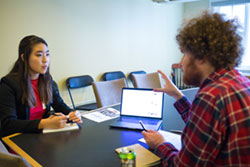
Sipho Kings, NF '18, leads a breakout session during the 2018 Georges Conference
In April, Nieman organized and hosted the 2018 Christopher J. Georges Conference on College Journalism in partnership with student journalists from The Harvard Crimson. Dozens of students from 19 college newsrooms attended. Keynote speaker Lois Beckett, a senior reporter at The Guardian US in New York who covers gun politics and policy and the rise of the far right, offered special insights into her reporting on gun violence. Other sessions featured Nieman Fellows and staff; Frank D. LoMonte, former executive director of the Student Press Law Center and current head of the Brechner Center for Freedom of Information at the University of Florida; a how-to session on the basics of podcasting led by Kerry Donahue, director of training at PRX; and a session on essential verification tools for reporting in the internet age taught by Aimee Rinehart, manager of training and international projects at First Draft. The students themselves shared information about special projects they completed and offered tips for overcoming obstacles in campus newsrooms.

From left: Nieman curator Ann Marie Lipinski, Michael S. Schmidt and Emily Steel
Also in the spring, Nieman curator Ann Marie Lipinski spoke with Emily Steel and Michael S. Schmidt, the New York Times reporters who broke the paper’s first major investigation of sexual harassment claims that came to light in 2017, about gender issues in journalism. Their coverage of harassment settlements at Fox News was eight months in the making and resulted in the downfall of on-air host Bill O’Reilly.
On the day after November’s midterm elections, Lipinski hosted Jill Abramson, former executive editor at The New York Times, and Nancy Gibbs, former editor-in-chief of Time magazine, for a wide-ranging discussion about women and double standards, Trump and truth, and diversity and trust. Lipinski also moderated “#metoo: Truths and Consequences,” a Schlesinger Library 75th Anniversary event at the Radcliffe Institute for Advanced Study.
Fellowships
In addition to offering Nieman’s usual full academic-year fellowships and Knight Visiting Nieman Fellowships, we welcomed three inaugural Abrams Nieman Fellows for Local Investigative Journalism as members of the class of 2019. After finishing two semesters at Harvard, they will receive funding for up to nine months of fieldwork at home, where they will work on a public service reporting project. The fellowships are funded by a generous grant from the Abrams Foundation designed to strengthen local news coverage in underserved communities across the United States.
The 2019 Abrams Nieman Fellows
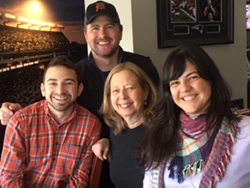
Nieman Board member Amy Abrams, center, with the three inaugural Abrams Nieman Fellows for Local Investigative Journalism, (from left) Benny Becker, Nathan Payne and Laura N. Pérez Sánchez
- Benny Becker, a public radio reporter for the Ohio Valley ReSource and WMMT/Appalshop, plans to research strategies for funding infrastructure in rural communities that are struggling with the collapse of an extractive economy. For his fieldwork, he will investigate these issues in multiple counties in eastern Kentucky and southern West Virginia.
- Nathan Payne, executive editor of Michigan’s Traverse City Record-Eagle, will study the impact of data-driven investigative journalism on public perceptions of local media organizations. His fieldwork will examine the effects of mental health policies on local communities.
- Laura N. Pérez Sánchez, an investigative reporter and editor from Puerto Rico, will study corruption in post-disaster recovery efforts, such as those following Hurricanes Katrina and Sandy, and how journalism can exercise better watchdog practices in reconstruction contexts. For her fieldwork, she will examine Puerto Rico’s ongoing reconstruction and use of relief funds after Hurricane Maria.
In the fall semester, the Nieman Abrams Fellows led a seminar on the impact of local journalism and how to protect it.
Applications for a second round of Abrams Nieman Fellows in the class of 2020 (U.S. candidates only) will be accepted through Feb. 18, 2019.
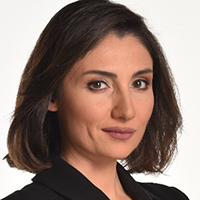
Afsin Yurdakul
Nieman also welcomed its first Robert L. Long Nieman Fellow, Turkish journalist Afsin Yurdakul, an anchor and correspondent for the Habertürk News Network. She is studying the impact of the Syrian refugee crisis on Turkey and other host nations. Additional Long Nieman Fellowships maybe be granted if any Turkish journalists are accepted in the next two Nieman classes.
Nieman announced the Harry M. Davis Nieman Fellowship in Science Journalism, funded by a gift from an anonymous donor made on behalf of Ella (Davis) Mazel in memory of her brother, Harry M. Davis, a science journalist and a Nieman Fellow in the class of 1941. Science journalists from both the United States and abroad are eligible for this fellowship opportunity at Harvard, which will be offered during the 2019-2020 academic year.
Nieman curator Ann Marie Lipinski joined a new commission led by Reporters Without Borders that’s working to promote democratic guarantees for news and information and freedom of opinion worldwide. In November, French President Emmanuel Macron promoted the initiative at the Paris Peace Forum and a dozen heads of state have signed on so far. It’s an important first step to institutionalize press freedom and protections for journalists at a time when governments are clamping down on journalists, sometimes in violent and brutal ways and when the press continues to be threatened and discredited by officials at the highest levels of government in some countries, including the U.S., fostering an atmosphere of public distrust of the media and new disregard for the truth.
Nieman Publications
Throughout 2018, Nieman published stories about many of the biggest challenges in journalism as well as opportunities.
- The Nieman Journalism Lab provides incisive reporting about the future of news, innovation and best practices in the digital media age. Its goals remain to help reporters and editors adjust to their online environment; to help traditional news organizations find a way to survive; and to help the new crop of startups entering the field. A sampling of the stories published in 2018 include multiple editions of Real News About Fake News; stories looking at how ProPublica and the Center for Investigative Reporting are expanding partnerships with local outlets; a profile of a German newspaper’s successful effort to build cross-partisan dialogue in a respectful manner; and a collection of the most interesting recent academic research into digital media, done in partnership with Journalist’s Resource at Harvard Kennedy School. The year ended with the Lab’s annual collection of predictions for the new year in journalism, written by a diverse group of digital innovators.
- In Nieman Reports, we published a special double issue ahead of the Nieman Foundation’s 80th anniversary in October. In “The Nieman 80,” Nieman alumni reflected on 80 pieces of journalism—presented in chapters divided by the themes of power, race, conflict, and people—that in some way had a significant impact on their lives and careers. Cover stories in 2018 included “Covering Addiction,” which highlighted the need for the media to provide a greater focus on treatment and recovery, and “Reinventing Local TV News,” a look at stations that are driving innovation and experimenting with new ways to attract younger, more diverse
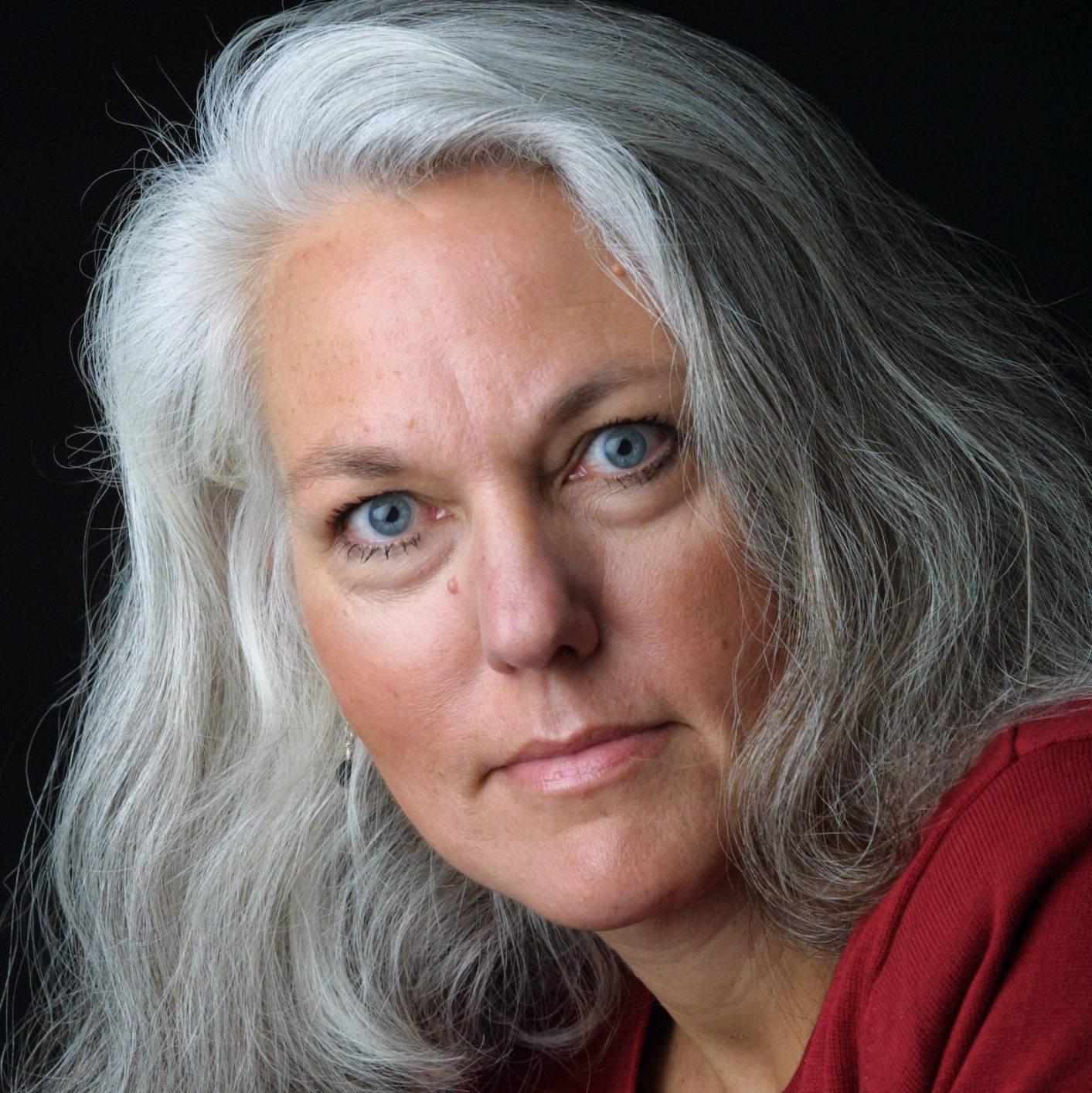
Jacqui Banaszynski
- Nieman Storyboard welcomed Pulitzer-winning writer Jacqui Banaszynski as its new editor in 2018. The site continues to expand its coverage of multimedia storytelling, especially podcasts and visual narratives, and has added an emphasis on work being done by smaller and non-legacy news sites and by a new generation of journalists. A few highlights from the past year: Freelancer, teacher and longform devotee Matt Tullis went to see the new documentary on Mister Rogers, then reached out to Rogers’ profiler Tom Junod; magazine writer and book author Kim Cross produced a “shop class” piece on what her 10-year-old, and she, learned from the Broadway smash “Hamilton”; environmental journalist Cheryl Katz used her expertise from the Arctic to annotate Craig Welch’s National Geographic piece exploring climate degradation in the Antarctic; and columnist and magazine writer Tommy Tomlinson, NF ’09, spoke to Chip Scanlan about his memoir of obesity.
Learn more about Nieman publications and the stories we covered in 2018.
Nieman Journalism Awards
With our annual journalism awards, Nieman recognizes excellence in journalism in six categories. In 2018:
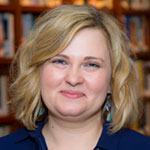
Elena Milashina
Novaya Gazeta reporter Elena Milashina received the Louis M. Lyons Award for Conscience and Integrity in Journalism in recognition of her groundbreaking investigative reporting on human rights abuses in Russia.
“The Tax Divide,” the result of an extensive two-year investigation led by reporter and 2015 Nieman Fellow Jason Grotto into the unfair property tax assessment system in Cook County, Illinois, won the Taylor Family Award for Fairness in Journalism. The series was published by the Chicago Tribune and ProPublica.
The Miami Herald won the Worth Bingham Prize for Investigative Journalism for its “Fight Club” series that exposed serious problems and abuse in Florida’s juvenile justice system and led to important reforms. The lead investigative reporters were Carol Marbin Miller and Audra D.S. Burch.
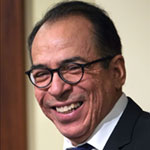
Alfredo Corchado
Two Joe Alex Morris Jr. Memorial Lectures were presented in 2018. Photojournalist Lynsey Addario and Alfredo Corchado, a 2009 Nieman Fellow and Mexico-border correspondent for The Dallas Morning News, each spoke about the challenges and rewards of covering events abroad.
Pioneering investigative reporter and author Charles Lewis was selected for the I.F. Stone Medal for Journalistic Independence.
Recipients of the Lukas Prize Project Awards were Amy Goldstein, winner of the J. Anthony Lukas Book Prize for “Janesville: An American Story” and Stephen Kotkin, winner of the Mark Lynton History Prize for “Stalin: Waiting for Hitler, 1929-1941.” The two J. Anthony Lukas Work-in-Progress Award winners were Chris Hamby for “Soul Full of Coal Dust: The True Story of an Epic Battle for Justice” and Rachel Louise Snyder for “No Visible Bruises: What We Don’t Know About Violence Can Kill Us.”
Nieman Programming
A wide variety of speakers came to Nieman’s Lippmann House for seminars, shop talks, master classes and informal conversations in 2018. Harvard professors, researchers, newsroom leaders, media innovators and many others shared their insights, experiences and tips in talks about newsroom best practices, audience engagement, multimedia storytelling and more.
Seminar Speakers
Steve Jarding, political consultant and lecturer in public policy at Harvard Kennedy School
Jon Lee Anderson, staff writer at The New Yorker
Srikant Datar, Arthur Lowes Dickinson Professor of Business Administration at Harvard Business School, led a workshop on how to use design thinking and innovation in journalism.
Bharat Anand, Henry R. Byers Professor of Business Administration at Harvard Business School and author of “The Content Trap: A Strategist’s Guide to Digital Change” discussed a case study about the international media group Schibsted with Nieman Fellows.
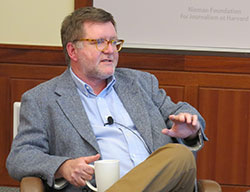
Arne Westad
Arne Westad, S.T. Lee Professor of U.S.-Asia Relations at Harvard Kennedy School
Jonathan Zittrain, co-founder and director of the Berkman Klein Center for Internet & Society, George Bemis Professor of International Law at Harvard Law School and Harvard Kennedy School; and professor of computer science at Harvard’s John A. Paulson School of Engineering and Applied Sciences
Samantha Power, Anna Lindh Professor of the Practice of Global Leadership and Public Policy at Harvard Kennedy School and Professor of Practice at Harvard Law School. Power served as the 28th U.S. Permanent Representative to the United Nations as well as a member of President Obama’s cabinet.
Joe Blatt, senior lecturer on education at the Harvard Graduate School of Education and director of the Technology, Innovation, and Education program at Harvard. He also directs the HGSE Faculty Focus on Teaching project and the “Entertainment through Education” series of Askwith Forum presentations. He created HGSE’s research website Usable Knowledge.

Cornel West
Cornel West, professor of the practice of public philosophy at Harvard Divinity School and a philosopher, political activist, author and public intellectual
Aymann Ismail, video editor and producer at Slate and creator of “Who’s Afraid of Aymann Ismail?” a video series that examines the Muslim American experience, and Kayla Wheeler, a visiting scholar in the African American Studies Program at Boston University and curator of the #BlackIslamSyllabus, a resource for scholars and journalists that seeks to center the experiences of Muslims of African descent. Ismail and Wheeler discussed reporting on Islam.
Evelynn Hammonds, Barbara Gutmann Rosenkrantz Professor of the History of Science and a professor of African and African American Studies at Harvard
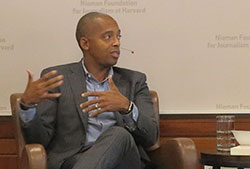
Khalil Gibran Muhammad
Khalil Gibran Muhammad, professor of history, race and public policy at Harvard Kennedy School and the Suzanne Young Murray Professor at the Radcliffe Institute for Advanced Studies
Todd Rogers, professor of public policy, Harvard Kennedy School
Stephen M. Walt, Robert and Renée Belfer Professor of International Affairs at Harvard Kennedy School and a contributing editor at Foreign Policy magazine
Talks Hosted by Fellows
2018 Nieman Fellow Lenka Kabrhelova, former U.S. correspondent for Czech Radio, spoke with Shaun Walker, Moscow correspondent for The Guardian.
Glenda M. Gloria, NF ’18, the managing editor and co-founder of the Filipino news site Rappler, led a discussion with 2012 Nieman Fellow John Nery, associate editor and opinion columnist at the Philippine Daily Inquirer, about attacks on the press in the Philippines and government attempts to shut down Rappler. Nery also shared his thoughts about the current climate for Filipino journalists in Nieman Reports. The class of 2018 issued a signed statement in support of Rappler and its journalists and called on Philippine President Rodrigo Duterte to cease all attempts to curtail media freedoms.
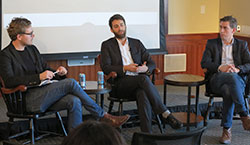
From left: Frederik Obermaier, Matthew Caruana Galizia and Laurent Richard
2018 Nieman Fellow Frederik Obermaier, an investigative reporter for the Munich-based Süddeutsche Zeitung, moderated a talk about journalists in danger with French investigative filmmaker Laurent Richard, founder of the Freedom Voices Network and Forbidden Stories, and journalist Matthew Caruana Galizia, whose mother, Maltese investigative journalist Daphne Caruana Galizia was murdered in 2017. Caruana Galizia discussed his mother’s work, the investigation into her killing and the legal threats facing Maltese journalists.
Obermaier also spoke with U.S. District Court senior judge Mark Wolf, who worked for the Attorney General’s office during Watergate and now teaches a class on international corruption at Harvard Kennedy School. They discussed the synergies and limitations of journalists, judges, and prosecutors, especially in the fight against corruption.
Adam Serwer, a senior editor at The Atlantic, discussed covering race and politics in Trump’s America
2019 Nieman Fellow Nathan Payne, executive editor of Michigan’s Traverse City Record-Eagle, and an Abrams Nieman Fellow for Local Investigative Journalism, led a conversation with Laura Carpenter, co-founder of Abridge News, a news startup that aims to present readers with multiple viewpoints from across the political spectrum.

Isabelle Roughol and Jonathan Jackson
Jonathan Jackson, the 2019 Nieman Berkman Klein Fellow in Journalism Innovation and a co-founder of Blavity, Inc., moderated a conversation with Isabelle Roughol, editorial team director at LinkedIn.
2019 Nieman Fellow Shaul Amsterdamski, the economics editor and a commentator Israel’s public broadcasting corporation Kan, discussed the concept of radical capitalism with economist E. Glen Weyl, a principal researcher at Microsoft Research New York City and co-author of “Radical Markets: Uprooting Capitalism and Democracy for a Just Society.”
2019 Niemans Myroslava Gongadze, Voice of America’s Ukrainian service chief in Washington, D.C., and photographer Samantha Appleton spoke with Timothy Patrick McCarthy, a Harvard lecturer on history and literature, public policy and education, about activism in journalism and academia. McCarthy is director of Culture Change & Social Justice Initiatives and the Emerging Human Rights Leaders Program at Harvard Kennedy School’s Carr Center for Human Rights Policy.
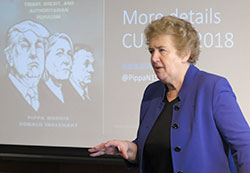
Pippa Norris
2019 Nieman Fellow Mary Ellen Klas, capital bureau chief for The Miami Herald in Tallahassee, Florida, organized and introduced a presentation by Pippa Norris, the Paul F. McGuire Lecturer in Comparative Politics at Harvard Kennedy School and director of the Electoral Integrity Project, who discussed the global rise of authoritarian populism and the relationship of the media to this emerging trend.
2019 Nieman Fellow Mattia Ferraresi, U.S. correspondent for the Italian newspaper Il Foglio, invited chef Massimo Bottura for a discussion about his culinary and charity work. Bottura is chef-patron of the top-rated Osteria Francescana restaurant in Modena, Italy, and founder of Food for Soul, a cultural nonprofit that promotes social awareness and solutions for food waste and hunger.
Shop Talk Speakers
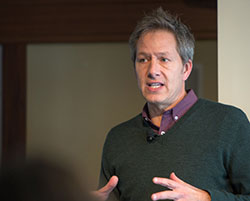
Jay Lauf
Jay Lauf, publisher and president of Quartz discussed extending the company brand, making failure part of company culture, verticalizing and more.
Jim Waldo, Gordon McKay Professor of the Practice of Computer Science and chief technology officer for Harvard’s John A. Paulson School of Engineering and Applied Sciences, led a session on privacy and cybersecurity.
Wolfgang Krach, editor of the Munich-based Süddeutsche Zeitung, Germany’s leading daily, spoke about his role overseeing the paper’s Panama Papers and Paradise Papers investigations during a session moderated by 2018 Nieman Fellow Mat Skene.
Hannah Allam, a Washington, D.C.-based reporter for BuzzFeed News and a 2009 Nieman Fellow spoke about her beat covering U.S. Muslim life. The talk was moderated by 2019 Nieman Fellow Shaul Amsterdamski.
Carine Fillot, the founder of French startup Hack the Radio and the winner of this year’s Next Journalism Prize, visited Nieman to discuss her work. Hack the Radio aims to improve podcasts and attract listeners. Fillot was joined by Florence Martin-Kessler, NF ’11, one of the prize co-founders, and the co-founder and editor in chief of Live Magazine, a storytelling show in Paris, Brussels, Strasbourg, and Marseille.


